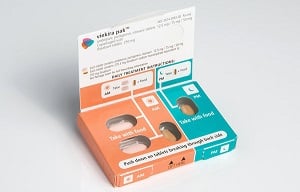Hepatitis C was supposed to be a boon for an entire slate of drugmakers: Bristol-Myers Squibb ($BMY), Merck & Co. ($MRK), AbbVie ($ABBV), and yes, the current dominant force, Gilead Sciences ($GILD). But that's not how the market has played out.
 Gilead, first to market with its next-gen drug Sovaldi, followed soon after with a combo med Harvoni, the first all-oral regimen in the field. So far, the companies that launched their meds later--AbbVie, Bristol-Myers, and now Merck--have had to settle for the crumbs under Gilead's table.
Gilead, first to market with its next-gen drug Sovaldi, followed soon after with a combo med Harvoni, the first all-oral regimen in the field. So far, the companies that launched their meds later--AbbVie, Bristol-Myers, and now Merck--have had to settle for the crumbs under Gilead's table.
Unfortunately for the newer launches, it's a pattern likely to continue, says Leerink Partners analyst Geoffrey Porges in a note to investors.
With a title that begins, "Another pretender to the HCV throne," Porges dissects the recent performance of AbbVie's hep C meds, Viekira Pak and Technivie; Bristol-Myers Squibb's Daklinza; and Merck's newest entrant Zepatier. And though it's early days for several of them, particularly Zepatier, Porges finds no evidence that the newer meds are stealing prescription share from Gilead.
Analysts have figured that Gilead's hep C revenue would erode "as a result of further price pressure with share loss--especially given Zepatier's introduction at a 40%-plus discount relative to Harvoni," Porges wrote. "However, our current analysis of IMS script data and review of the largest payer plan formularies reveal that Gilead's HCV [direct-acting antiviral drugs] are continuing to dominate the market, with modest share gains for rivals."
 Only Daklinza, which is often prescribed alongside Sovaldi, has captured significant script volume, Porges says. AbbVie's Viekira Pak, launched in late 2014, counts total scripts that amount to 6.7% of Gilead's numbers, on average, over the past four weeks, he says. Technivie's total prescription count was 0.1% of Gilead's over the same period, with Zepatier at 1.1%.
Only Daklinza, which is often prescribed alongside Sovaldi, has captured significant script volume, Porges says. AbbVie's Viekira Pak, launched in late 2014, counts total scripts that amount to 6.7% of Gilead's numbers, on average, over the past four weeks, he says. Technivie's total prescription count was 0.1% of Gilead's over the same period, with Zepatier at 1.1%.
One reason for Gilead's continued dominance is that Sovaldi and Harvoni boast the largest number of indications in the group. One or both are the only meds approved for genotypes 1 through 6, and they're the only ones recommended for patients with decompensated cirrhosis, the analyst points out, citing payer comments. AbbVie's meds now have a warning against use in patients with advanced liver disease, and liver testing is recommended for certain Zepatier patients after 8 weeks of therapy, he notes.
That's not to say that Merck, Bristol-Myers and AbbVie aren't scrapping for share--or that they have no hope of gaining momentum if they can get more payers to sign on for coverage. Zepatier, approved less than three months ago, when payers had already sewn up deals with Gilead and AbbVie for the year, is in the early stages of payer negotiations, and reimbursement is obviously key for capturing scripts.
Express Scripts ($ESRX) CMO Steve Miller says to watch out for Zepatier gains in 2017. "What you'll see is the Merck team doing a lot of negotiating this year, and you'll see the drug gain traction next year," Miller said soon after the Merck launch.
Plus, Merck has connections in hep C, thanks to Incivek, a previous blockbuster knocked off the market by the latest generation of treatments. "[W]e know the players, and we know the managed care organizations very, very well," Adam Schechter, Merck's president of global human health, said during its Q3 conference call. "We intend to be serious about coming into this market strong, and we think there's a real opportunity for us."
Special Reports: Top 15 pharma companies by 2014 revenue - Merck - AbbVie - Gilead | Biopharma posts a chart-topping 41 new drug approvals in 2014 - Harvoni - Viekira Pak